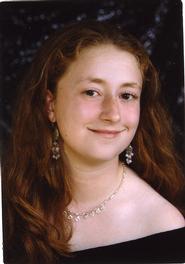
All of us remember learning about recycling in school. We are taught to recycle plastics as much as possible, but how much plastic do scientists give back to the industry? Diana Di Leonardo '10 (Malverne, N.Y.) asks this question in her research this summer. Concentrating on the recycling of plastic from cell and molecular biology labs, Di Leonardo and her faculty collaborator, Professor of Biology Jinnie Garrett, will research just how much is recycled in the workplaces of those who tell us to recycle.
Di Leonardo plans to address her research by analyzing the recycling behavior of the top research schools in the country. She will also interview members of the lab staff about what they do to recycle waste from their cell and molecular biology labs.
Although still waiting for some responses, Di Leonardo says that most of the universities with whom she has spoken recycle through a deal with the manufacturers of the product. But they will recycle only one thing: the plastic trays which contain pipette tips.
Pipettes, lab measuring instruments, are nearly ubiquitous in all fields of biology and require special plastic tips to make their precise measurements. The trays which hold the tips can be returned to the manufacturer and recycled, but other plasticware such as the tips themselves, petrie dishes (flat circular dishes for growing bacteria) or tubes from the mixing machine called a centrifuge are not accepted by the manufacturers and so are not recycled. These generally cannot be recycled because their contact with the experimental material makes them a biological liability.
The other part of the research is the more traditional part. When she is not calling university biology labs, Di Leonardo is pursuing a heavy reading course of articles and books about recycling. She is currently researching the potentials of bio-plastics, plastics made from natural materials; one book even gave recipes for making your own bio-plastics out of ingredients from the grocery store.
During the year, Di Leonardo plays intramural soccer, studies ballroom dance, and is a member of Hamilton's Mock Trial team. She is enjoying her first summer doing research and looks forward to taking more geoscience courses.
Her research is funded by the Emerson Foundation Grant Program, which provides students with significant opportunities to work collaboratively with faculty mentors, researching an area of mutual interest. Recipients typically undertake some combination of fieldwork, laboratory investigation, library research and the development of teaching materials. A public presentation of their findings is required of all Emerson Scholars during the academic year.
- Lisbeth Redfield
Di Leonardo plans to address her research by analyzing the recycling behavior of the top research schools in the country. She will also interview members of the lab staff about what they do to recycle waste from their cell and molecular biology labs.
Although still waiting for some responses, Di Leonardo says that most of the universities with whom she has spoken recycle through a deal with the manufacturers of the product. But they will recycle only one thing: the plastic trays which contain pipette tips.
Pipettes, lab measuring instruments, are nearly ubiquitous in all fields of biology and require special plastic tips to make their precise measurements. The trays which hold the tips can be returned to the manufacturer and recycled, but other plasticware such as the tips themselves, petrie dishes (flat circular dishes for growing bacteria) or tubes from the mixing machine called a centrifuge are not accepted by the manufacturers and so are not recycled. These generally cannot be recycled because their contact with the experimental material makes them a biological liability.
The other part of the research is the more traditional part. When she is not calling university biology labs, Di Leonardo is pursuing a heavy reading course of articles and books about recycling. She is currently researching the potentials of bio-plastics, plastics made from natural materials; one book even gave recipes for making your own bio-plastics out of ingredients from the grocery store.
During the year, Di Leonardo plays intramural soccer, studies ballroom dance, and is a member of Hamilton's Mock Trial team. She is enjoying her first summer doing research and looks forward to taking more geoscience courses.
Her research is funded by the Emerson Foundation Grant Program, which provides students with significant opportunities to work collaboratively with faculty mentors, researching an area of mutual interest. Recipients typically undertake some combination of fieldwork, laboratory investigation, library research and the development of teaching materials. A public presentation of their findings is required of all Emerson Scholars during the academic year.
- Lisbeth Redfield
Posted June 29, 2007
